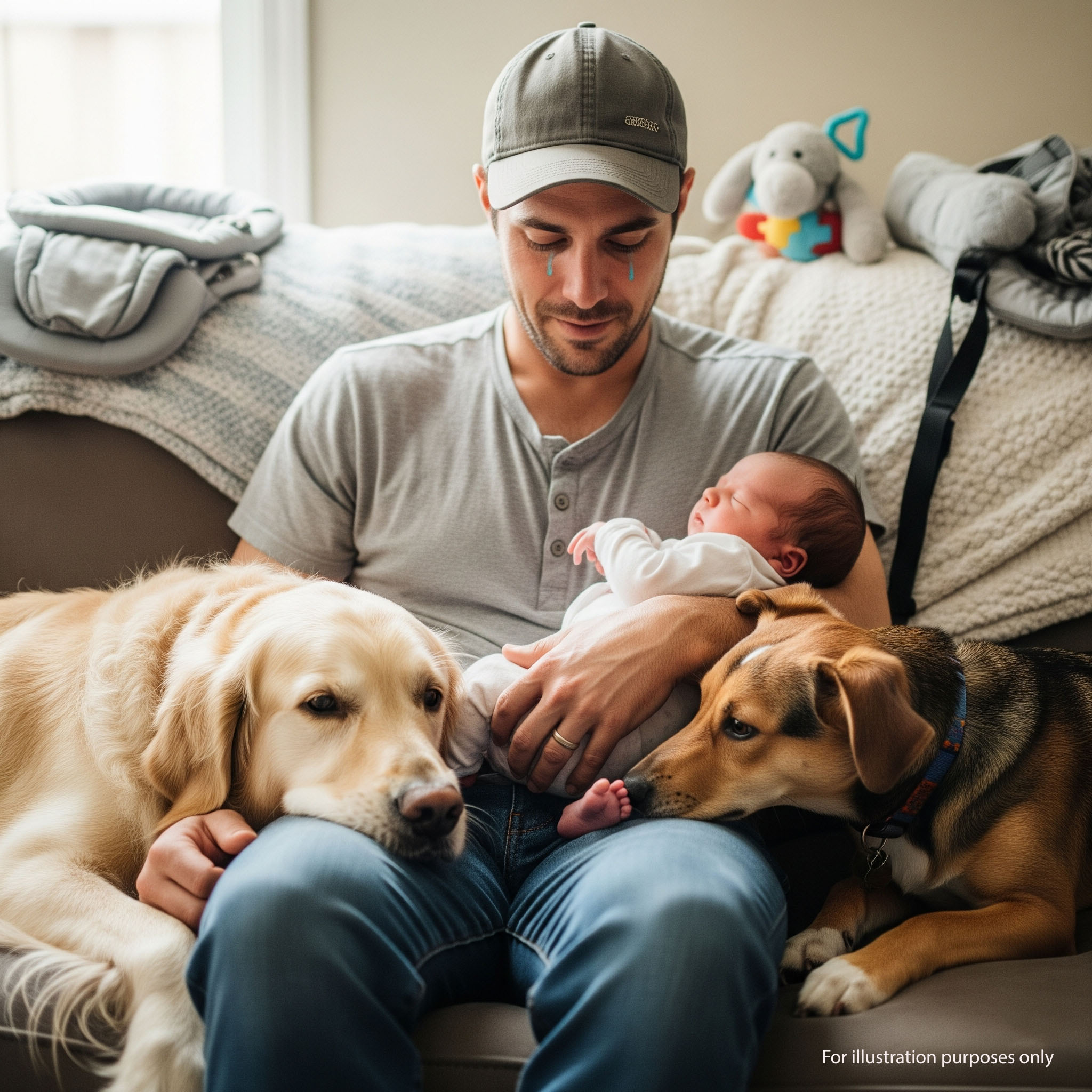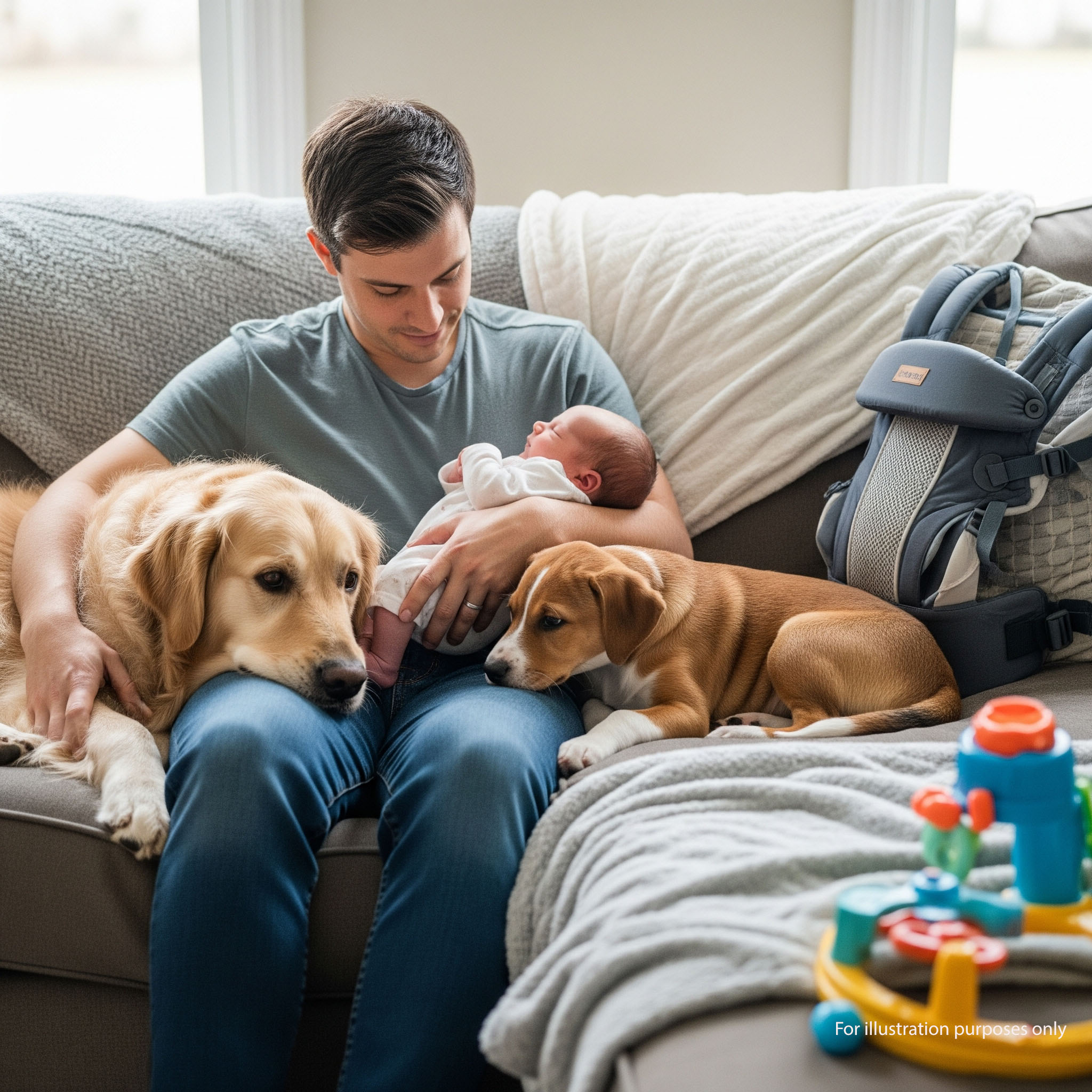He tried to play it cool. But every time I brought up the dogs meeting the baby, he’d get quiet. Not the “I’m thinking” kind of quiet. The “I’m afraid of what might happen” kind.
“They’re gonna freak,” he said once, almost to himself. “Too much noise, too much change. They won’t understand.”
I knew the history. Those dogs were with him before I was. Lacey, calm and wise, had seen him through panic attacks in the dead of night. Max, younger and all nerves, was his shadow when the world got too loud. They weren’t just pets—they were his lifeline through a chapter he rarely talked about.
So yeah, bringing a newborn into their territory felt like lighting a match in a room full of fireworks.
When we walked through the door, everything held its breath.
He lowered himself onto the couch with our daughter in his arms—so gentle, like he was holding something breakable made of stars.
The dogs rushed in like they always did—claws clicking on hardwood, tails wagging like metronomes on overdrive. Then… they stopped.
Completely.

Lacey tilted her head. Took one step closer. Rested her chin on his knee and looked—really looked—at the baby. Eyes wide, body still. As if she were remembering something.
Max sniffed once, then laid his head under our daughter’s socked foot like it was the most natural thing in the world.
He didn’t speak. Just stared down, lips trembling.
“They used to do this when my mom held me,” he whispered.
And just like that, the room shifted.
He’d never mentioned his mother like that before. I knew she’d died when he was young, but her memory always felt like a locked drawer. That night, the drawer creaked open.
“Same couch,” he added. “Same dogs. Well… almost. Different bodies. Same look in their eyes.”
That night, Max didn’t sleep. Not really. He laid beside the crib, alert, every muscle poised like a sentinel. Every time the baby stirred, he raised his head and looked to us. Just checking. Just watching.
We were no longer two people with dogs. We were a pack.
Over the weeks, things changed in ways I didn’t expect. Max, our noise-sensitive tornado, turned serene around the baby. Lacey nudged the swing when it slowed, nuzzled mittens to check if they were warm.
And my husband? He changed the most. He used to brace for failure, expect things to break. Now, he stayed up during late feedings not from worry—but wonder. Awe, even.
One afternoon, I found him asleep in the nursery, baby on his chest, Max curled beside him like a furry comma. He looked like peace personified.
When I stirred him, he smiled. “Feels like I’m getting to do it right this time.”
I didn’t ask. But later that night, he told me.
“When my mom died, I was angry. So angry. I locked it all away. Lacey was the only thing I didn’t push away.”
He looked at the crib.
“She used to say, ‘Dogs show us how to love with our whole hearts and no words.’ I didn’t understand what she meant. Until now.”
Then, life reminded us how fragile joy can be.
I stepped out one afternoon for groceries—fifteen minutes, tops. He stayed home, said he had it handled. But the door didn’t latch. A gust of wind. A distraction. And then—
Max barked. Loud. Panicked.
I returned to find the front door wide open and Max sprinting toward the sidewalk, barking wildly at something I couldn’t see.
My heart dropped.
A flash of white fluttered in the street—her blanket.
I ran inside, lungs barely working.
The baby was safe. Still in her bassinet.
My husband was pale, shaken to the core. “I—I thought—” he stammered. “She kicked the blanket off, and the wind—Max wouldn’t stop barking—I thought she was gone.”
We held her like she was made of glass for hours after that. But from that moment on, we never doubted the dogs again.
They weren’t confused. They weren’t overwhelmed.
They knew.
And then came the storm we never saw coming.
At a routine checkup, the doctor frowned. “Her color’s a little off,” he said. “Let’s just run a few tests.”
Hours passed. A sterile gray room. A silence that pulsed.
When the pediatrician returned, he was kind but firm.
“A heart murmur,” he said. “It’s manageable. But surgery may be necessary.”
Time broke into before and after.

The baby’s breath became a countdown. Her heartbeat, a ticking clock.
When we brought her home, the dogs were different. Max lay with his head on her chest, ears perked, unmoving for hours. Lacey followed me room to room like a shadow made of love.
The night before surgery, we sat on the floor—no pretense, no pride. Just the three of us, hands on the baby, surrounded by two still dogs.
“I’ll give anything,” he whispered. “Just let her be okay.”
The next day, hours later, the surgeon smiled.
“She’s strong,” he said. “You’ve got a little fighter.”
We both cried—unapologetically.
When we got home, Lacey spun in circles. Max whimpered and licked her feet, like welcoming royalty.
Weeks passed. The fear faded, replaced by fierce, sacred joy.
And then, one quiet morning in the attic, I found a photo. Tucked into a baby book. His mother, on our same couch, cradling him.
And beside her… a dog. Not Lacey. But her mirror.
“Daisy,” he said softly, when I showed him. “She died when I was six.”
“You think…?” I asked.
He nodded. “I think some love stays behind. Maybe dogs carry it. Maybe they come back to finish what they started.”
Now, our baby is strong. Laughs loud. Crawled first toward Max, of course.
Lacey is older now. Her walks are slower. But every night, she lies by the nursery door like a soldier on duty.
Sometimes, my husband reads letters to his mom out loud. He doesn’t cry when he does. He smiles.
And the dogs? They listen.
I once feared bringing a baby home to two anxious dogs.
Now I know better.
They didn’t need to be taught how to love her.
They remembered how.
And if you ever wonder whether animals know what love means—just wait until they show you.